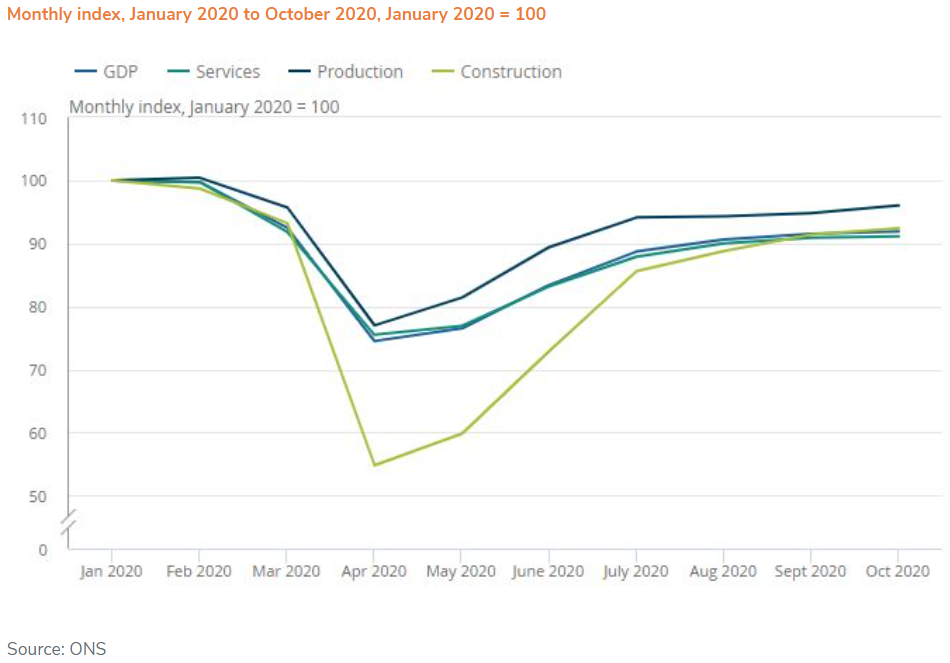 2020 saw the construction industry take the hardest hit of any sector. It was a historically difficult year for companies in every industry, with only a very few sectors, such as food services, having anything positive to take from the year.
2020 saw the construction industry take the hardest hit of any sector. It was a historically difficult year for companies in every industry, with only a very few sectors, such as food services, having anything positive to take from the year.
While things certainly did pick up in the final quarter of 2020, and construction was able to operate to ‘new normal’ standards for a time, recovery is still in its earliest days. The pandemic dealt numerous body blows to the industry, including;
– non-essential work being cancelled or postponed
– plummeting customer confidence leading to delayed or cancelled projects
– new working practices rendering some jobs unsafe without difficult, costly and time-consuming implementation of health and safety legislation
Of course, the pandemic is not the only shockwave the construction industry is grappling with. Brexit has seen the number of EU construction workers choosing to remain in the UK decline by 28%. In Construction News, one London-based construction director is quoted as saying that, in her experience,
“When (Brexit) became a reality, people decided to go back to Poland – even the ones who had mortgages here, children at school and a pretty settled life.”
That’s not just a loss of staff – that’s a loss of long-term, skilled, motivated staff, who understood the work, the customers, and the company culture. The cost of replacing them can’t easily be guessed but it is surely vast, and will be the end of the road for some small companies which are surviving from job to job.
Can your company take much more?
At United Capital we talk to dozens of companies in the construction and building services sectors every month, and have done so throughout the pandemic. We’ve seen a huge disparity in how companies have coped with the ever-changing circumstances; these are the factors that seem to count when it comes to survival.
– Pre-pandemic robustness: The companies that come out of this situation strongly will be those that went into it the same way. Companies with dynamic leadership have been able to meet the moment by pivoting their services and priorities. When projects were paused, they kept a cool head and worked with their customers to close down sites safely. When faced with lockdown, they took that rare time to invest in infrastructure or IT upgrades, and had time to make sure they were accessing every government grant on offer. Less stable companies were closed down in panic mode, and were not fleet of foot enough to try to build something good out of the enforced lockdown period
– Access to expertise: Shockingly, lockdown rules in England have changed at least 64 times since the beginning of the pandemic. That means changes have passed into law every 4.5 days. No business leader can keep up with those changes while also doing their day job to the best of their ability. External legal, HR, and health and safety expertise might be the difference between a business that can operate safely within the law, and a company that inadvertently breaches the rules and faces being fined or shut down
– Options: A small company trading from contract to contract has few options once finances start to become difficult. If there’s no flexibility or ‘slack’ built into a business, it is unable to bend – it can only break. Businesses which have options – a larger group to turn to for financial aid, marketing support, or better procurement terms, for example – will be able to build out their future plans with more certainly, confidence and financial backing.
The critical factor: group strength
With the pandemic set to loom over 2021 just as it did the previous year, and with Brexit just barely making its presence felt yet, there are going to be more challenges than ever in our industry. But construction is so vital: the work we do is laying the foundations of our future society, and it must continue uninterrupted for as long as possible.
What we believe, and what we hear from other leaders in the construction industry, is that the strength and security of a group is the critical factor that can address the three issues mentioned above. That’s why our plan for acquiring construction and building services companies is being ramped up in 2021; we are bringing security and stability back to the sector which has had the worst of the pandemic so far.



